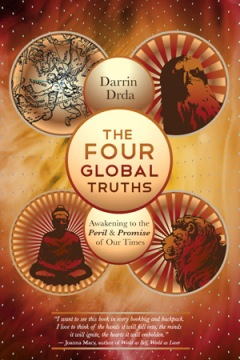
It’s hard to imagine a single phrase that has had a more profound impact on human civilization than the one enshrined in the United States Declaration of Independence: “the pursuit of happiness.” The exercise of this unalienable right has served as a primary driving force of the entire American enterprise, which in turn has dramatically reshaped the rest of the world, both physically and psychologically. Through globalization, an ever-growing percentage of humanity is joining the chase, which might be a good thing if not for a few deep and related flaws in the Founding Fathers’ famous phrase.
The most obvious and dire problem is the widespread conflation of happiness with material gain, which can be traced back to the Founding Fathers themselves. However noble their intentions, they were constrained by Enlightenment values and blinded by their own privilege as wealthy landowners, and in some cases slaveholders. To be fair, they borrowed the phrase in question from the English philosopher John Locke, whose shortlist of unalienable rights included “Life liberty, and estate,” meaning property.
Another portion of the blame can be assigned to Calvinism, a Protestant denomination that has had—and continues to have—an enormous influence on American culture. In a near total inversion of traditional Christian morality, Calvinists regard wealth as a sign of piety and a mark of God’s grace, whereas poverty and rebelliousness indicate an individual who is hopelessly hell-bound.
Apart form these historical influences on the USA’s MO, there’s an important psychological reason why the pursuit of happiness remains married to material gain: we’re all constantly besieged by ads telling us that fulfillment lies in the acquisition of a certain product and the achievement of a certain lifestyle, and we have been since childhood. In fact, in recent years the advertising industry has been targeting ever-younger children, including toddlers, in a ruthless and highly effective campaign to instill consumerism in kids.
Of course, we’re also taught that money can’t buy happiness, but we refuse to believe it despite personal experience. Additionally, the old adage has received new support from scientific studies, such as one by economist Richard Layard showing that once people’s basic needs are met, greater income provides them no additional happiness, and in fact makes them more prone to depression, anxiety, and substance abuse. The magic number, the salary at which happiness peaks, is about $20,000 per year.
(If your inner voice screams, “I can’t live on that!” then consider that half of humanity lives on $900/year, while one quarter squeaks by on $450/year. According to a recent Daily Mail article, the global average salary is $1225/year, and a salary of $32,000 puts you in the global 1 percent. And yes, these numbers are adjusted for purchasing power, so there’s no arguing about how much 32K would buy in Bangladesh.)
So if 20K is the optimum annual salary (actually, it’s far less, all things considered), then why do we continuously clamor for more? The simple truth is that once someone achieves a certain standard of living, she becomes attached to it and can’t imagine living with less. Former extravagances become necessities, and the pursuit becomes a vicious, unending cycle. In general, we underestimate the addictive nature of money and possessions, forever imagining that we’d be happy with just a little more.
Finally we come to the biggest bug in the operating system, a flaw so glaring that we generally fail to see it: happiness cannot be pursued. Clearly it cannot be found in some external object or future situation, in some other place and time. It can only arise here and now, and only when allowed to do so. This is because happiness is actually our default setting, our natural state, which gets obscured by the desire for more. In other words, happiness is prevented by pursuit, in the same way that a forgotten name or number won’t usually come to mind until you stop thinking about it.
The poet Guillaume Appollinaire put it succinctly: “Sometimes it’s good to pause in our pursuit of happiness and just be happy.”
As it turns out, happiness is not a product but a practice. It abides in the heart, a muscle that can be exercised through the cultivation of everyday contentment, gratitude, and generosity, which arise whenever the craving for more is relinquished. Indeed happiness comes not from having but from giving, and is borne from a deep understanding of human interconnection. Had the Founding Fathers understood this more deeply, they could have issued a Declaration of Interdependence based on life, liberty, and love, thereby saving everyone a lot of trouble.

